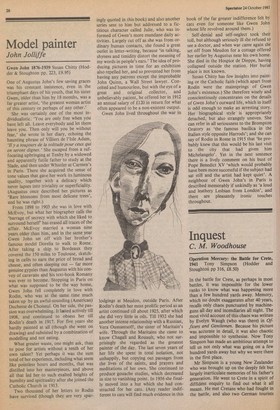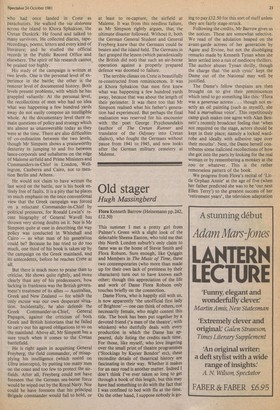Inquest
C. M. Woodhouse Operation Mercury: the Battle for Crete, 1941 Tony Simpson (Hodder and Stoughton pp 316, £8.50) In the battle for Crete, as perhaps in most battles, it was impossible for the lower ranks to know what was happening more than a few hundred yards away. Memory, which no doubt exaggerates after 40 years, recalls only chaos punctuated by machineguns all day and incendiaries all night. The most vivid account of this chaos was written by Evelyn Waugh (who was there) in Officers and Gentlemen. Because his picture was accurate in detail, it was also chaotic and impossible to synthesise. Now Tony Simpson has made an ambitious attempt to tell us not only what was going on a few hundred yards away but why we were there in the first place.
Mr Simpson is a young New Zealander who was brought up on the deeply felt but largely inarticulate memories of his father's generation. He went to Crete in a spirit of diffident enquiry to find out what it all meant. He met Cretans who had fought in the battle, and also two German tourists who had once landed in Crete as parachutists. He walked the via dolorosa across the island to Khora Sphakion, the Cretan Dunkirk. He found and talked to many survivors. He collected diaries, taperecordings, poems, letters and every kind of literature; and he studied the official records in the Public Record Office and elsewhere. The spirit of his research cannot be praised too highly.
His study of the campaign is written at two levels. One is the personal level of experience in the battle; the other is the remoter level of documented history. Both levels present problems, with which he has grappled valiantly. At the personal level, the recollections of men who had no idea what was happening a few hundred yards away do not easily compose an intelligible whole. At the documentary level there remain questions of policy and strategy which are almost as unanswerable today as they were at the time. There are also difficulties of co-ordination between the two levels, though Mr Simpson shows a praiseworthy dexterity in jumping to and fro between lance-corporals and subalterns on the edge of Maleme airfield and Prime Ministers and Commanders-in-Chief in London, Wellington, Canberra and Cairo, not to mention Berlin and Athens.
He would not claim to have written the last word on the battle, nor is his book entirely free of faults. It is a pity that he places so much emphasis on the once conventional view that the Greek campaign was forced on a reluctant Commander-in-Chief by political pressures, for Ronald Lewin's recent biography of General Wave11 has thrown very strong doubts on it. Nor is Mr Simpson quite at ease in describing the way policy was conducted in Whitehall and Cairo — as what man of his generation could be? Because he has tried to do too much, one third of his book is taken up by the campaign on the Greek mainland, and its antecedents, before he reaches Crete at all.
But there is much more to praise than to criticise. He shows quite rightly, and more clearly than any of his predecessors, how lacking in frankness was the British government's treatment of its allies — Australian, Greek and New Zealand — for which the only excuse was our own desperate situation. Incidentally, he also defends the Greek Commander-in-Chief, General Papagos, against the criticism of both Greek and British historians that he failed to carry out his agreed obligations to us on the mainland. Above all, Mr Simpson has a sure touch when it comes to the Cretan battlefield.
He is right again in acquitting General Freyberg, the field commander, of misapplying his intelligence (which rested on Ultra intercepts), by putting too many men on the coast and too few to protect the airfields. After all, Freyberg could not have foreseen that the German sea-borne force would be wiped out by the Royal Navy. Nor could he have foreseen that his principal Brigade commander would fail to hold, or at least to re-capture, the airfield at Maleme. It was from this needless failure, as Mr Simpson rightly argues, that, the ultimate disaster followed. Without it, both the German General Student and General Freyberg knew that the Germans could be beaten and the island held. The Germans,in fact grasped the lesson (which paradoxically the British did not) that such an air-borne operation against a properly prepared defence was doomed to failure.
The terrible climax on Crete is beautifully re-constructed from reminiscences. It was at Khora Sphakion that men first knew what was happening a few hundred yards away, because that was about the length of their perimeter. It was there too that Mr Simpson realised what his father's generation had experienced. But perhaps the final realisation was reserved for his encounter with the poet George Psychoundakis (author of The Cretan Runner and translator of the Odyssey into Cretan dialect), who fought the Germans without pause from 1941 to 1945, and now looks after the German military cemetery at Maleme.



































 Previous page
Previous page